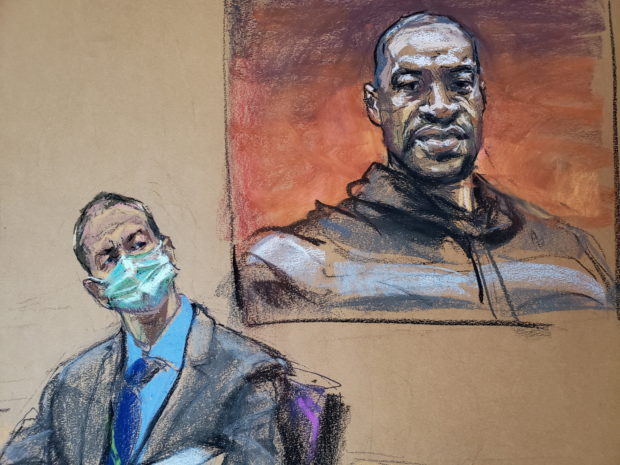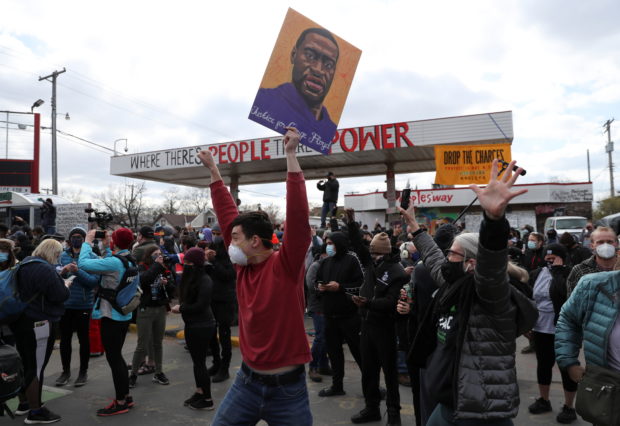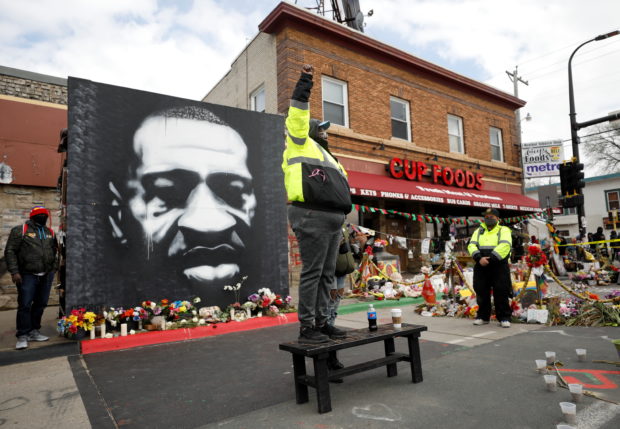Minneapolis jury convicts ex-policeman Derek Chauvin of murdering George Floyd

Former Minneapolis police officer Derek Chauvin sits in front of a picture of George Floyd displayed during Chauvin’s trial for second-degree murder, third-degree murder and second-degree manslaughter in the death of Floyd in Minneapolis, Minnesota, U.S., March 29, 2021 in this courtroom sketch from a video feed of the proceedings. REUTERS/Jane Rosenberg
MINNEAPOLIS – Former Minneapolis policeman Derek Chauvin was convicted of murder on Tuesday in the arrest of George Floyd, a milestone in the fraught racial history of the United States and a rebuke of law enforcement’s treatment of Black Americans.
The 12-member jury found Chauvin, 45, guilty of all charges including second-degree murder, third-degree murder and manslaughter after considering three weeks of testimony from 45 witnesses, including bystanders, police officials and medical experts. Deliberations began on Monday and lasted just over 10 hours.
In a confrontation captured on video, Chauvin, who is white, pushed his knee into the neck of Floyd, a 46-year-old Black man in handcuffs, for more than nine minutes on May 25, 2020, as he and three fellow officers arrested Floyd, who was accused of using a fake $20 bill to buy cigarettes at a grocery store.
Chauvin, wearing a gray suit with a blue tie and white shirt as well as a light-blue pandemic-related face mask, nodded and stood quickly when the judge ruled that his bail was revoked after the verdict was read.
He was taken out of the courtroom in handcuffs and placed in the custody of the Hennepin County Sheriff.
Article continues after this advertisementOutside the courthouse, a crowd of several hundred people erupted in cheers when the verdict was announced. Cars honked and chants of “George Floyd” and “All three counts” broke out.
Article continues after this advertisementChris Dixon, a 41-year old Black Minneapolis resident, had tears rolling down his face.
“I was hoping that we would get justice and it looks like we did,” he said. “I’m just very proud of where I live right now.”
At George Floyd square in Minneapolis, the intersection where Floyd was killed and is now named after him, people screamed, applauded and some threw dollar bills in the air in celebration. The site has since become a rallying point for racial justice protests.

People react after the verdict in the trial of former Minneapolis police officer Derek Chauvin, found guilty of the death of George Floyd, at George Floyd Square in Minneapolis, Minnesota, U.S., April 20, 2021. REUTERS/Adrees Latif
“Justice for Black America is justice for all of America,” the Floyd family’s attorney Benjamin Crump said in a statement. “This case is a turning point in American history for accountability of law enforcement and sends a clear message we hope is heard clearly in every city and every state.”
Chauvin had pleaded not guilty to the charges of second-degree unintentional murder involving “intentional infliction of bodily harm,” third-degree unintentional “depraved mind” murder involving an “act eminently dangerous to others,” and second-degree manslaughter involving a death caused by “culpable negligence.”
While the U.S. criminal justice system and juries have long given leeway and some legal protection to police officers who use violence to subdue civilians, the jurors in this case found that Chauvin had crossed the line and used excessive force.
Under Minnesota sentencing guidelines, Chauvin faces 12-1/2 years in prison for his murder conviction as a first-time criminal offender. Prosecutors could, however, seek a longer sentence up to the maximum of 40 years if Hennepin County District Judge Peter Cahill, who presided over the trial, determines that there were “aggravating factors.”
In Minnesota, convicted criminals generally leave prison on supervised release after completing two thirds of their sentence. Chauvin had no previous criminal convictions.
The jury included four white women, two white men, three Black men, one Black woman and two multiracial women, according to court records.
Earlier on Tuesday, U.S. President Joe Biden said he had spoken by phone with members of Floyd’s family.
“They’re a good family, and they’re calling for peace and tranquility, no matter what that verdict is. I’m praying the verdict is the right verdict, which is – I think it’s overwhelming in my view. I wouldn’t say that unless the jury was sequestered now, (would) not hear me say that,” Biden told reporters at the White House.
The intersection of race and law enforcement has long been contentious in the United States, underscored by a series of deadly incidents involving white police officers and Black people in a number of American cities in recent years.
Floyd’s death prompted protests against racism and police brutality in many cities in the United States and around the world last year.
The Minneapolis Police Department fired Chauvin and three other officers the day after Floyd’s arrest. The three others are due to face trial later this year on aiding-and-abetting charges in Floyd’s death.
MEDICAL EXPERTS
A cardiologist, a pulmonologist, a toxicologist and a forensic pathologist were medical experts called by prosecutors to testify that videos and autopsy results confirmed that Chauvin killed Floyd by compressing his body into the street in a way that starved him of oxygen.
The defense argued that Chauvin behaved as any “reasonable police officer” would have under these circumstances, and sought to raise doubts about the cause of Floyd’s death, saying heart disease or even the exhaust fumes from the nearby police car may have been factors.
Darnella Frazier, a teenager who told the jury she was taking her 9-year-old cousin to the Cup Foods grocery store that evening to get snacks, was among the witnesses called by prosecutors after jurors began hearing testimony on March 29.

A man gestures on a bench, as the verdict announcement is expected in the trial of former Minneapolis police officer Derek Chauvin, who is facing murder charges in the death of George Floyd, at the George Floyd Square in Minneapolis, Minnesota, U.S., April 20, 2021. REUTERS/Octavio Jones
Frazier had used her cellphone to make a video depicting Floyd’s excruciating ordeal, images that catalyzed the subsequent protests. Floyd can be heard on the video crying out for his mother and telling officers he could not breathe. Eventually Chauvin lifted his knee to allow paramedics to place Floyd’s limp body onto a stretcher.
Other eyewitnesses described the horror and lingering trauma of watching Floyd die in front of them. Courteney Ross, Floyd’s girlfriend of nearly three years, recalled their first kiss and their shared struggle with opioid addiction.
Minneapolis Police Chief Medaria Arradondo appeared as a prosecution witness to testify that Chauvin’s actions during the arrest represented an egregious breach of his training.
Throughout the trial, Chauvin wore a suit and took notes on yellow legal pads while sitting alongside defense attorney Eric Nelson. Members of Floyd’s family took turns attending the trial, though some tried to avert their gaze when video of Floyd’s death, recorded from multiple angles, was replayed to jurors.
The judge ordered the jurors to be sequestered after they began deliberations.